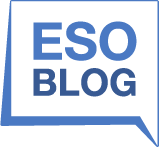- What it’s like to work with actual astronomical data
- The challenges of an online summer school and how to overcome them
- The skillset students get via ESO’s Summer Research Programme
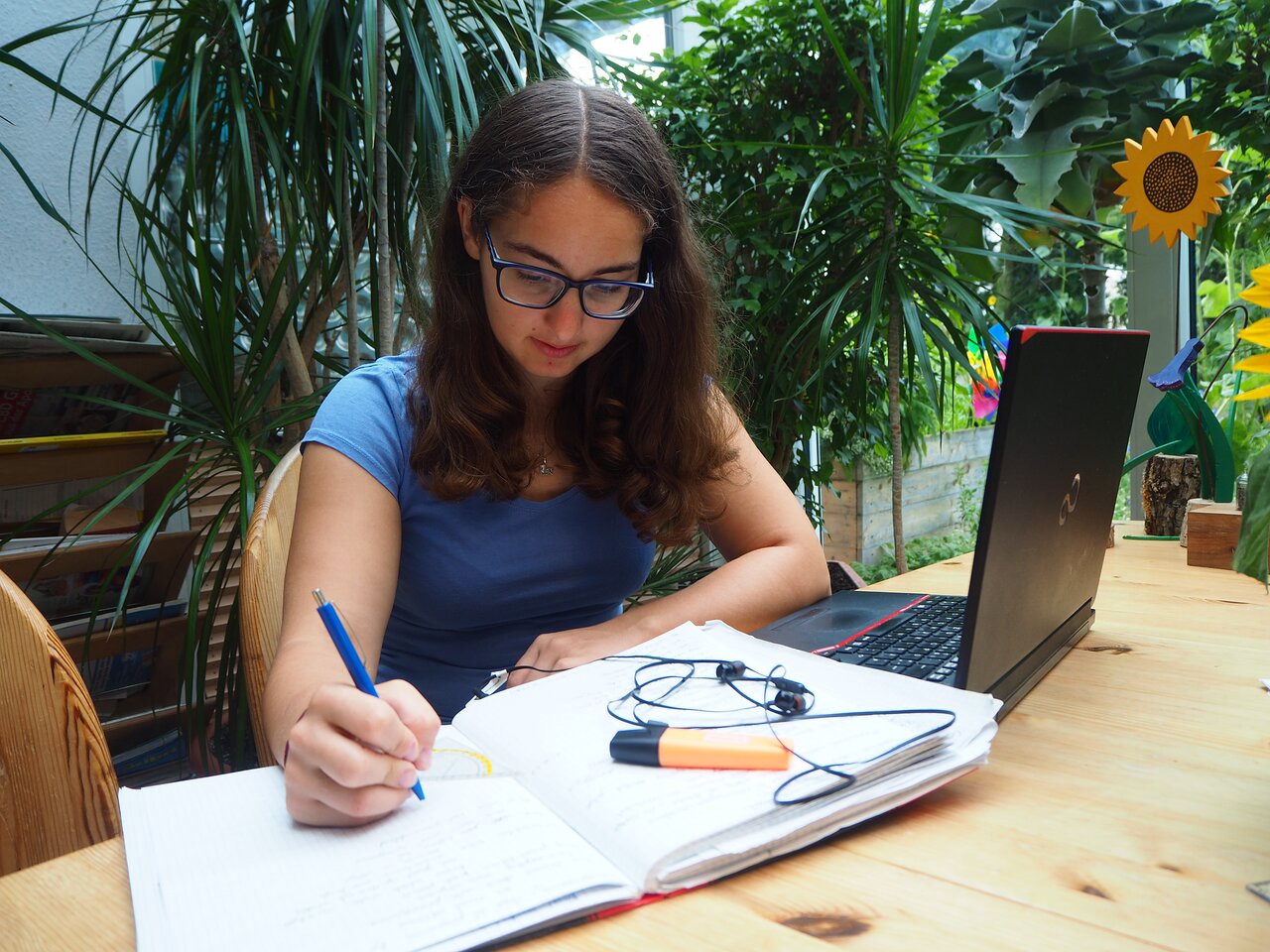
Name: Anna Lena Schaible
Nationality: German
University: University of Stuttgart, Germany
Project: Spiral arms as drivers of chemical enrichment in galaxies
Advisors: Laura Sánchez-Menguiano and Dimitri Gadotti
“My research project was looking at the distribution of heavy elements in the barred spiral galaxy NGC4981, calculating the oxygen abundance in different regions of the galaxy.
For my project, working remotely worked really well. My supervisors supported me and spent a lot of time explaining and discussing my questions on the topic. No matter what question I had or what problem occurred when working on the project, I could contact them.
It is incredible how much I have learnt the past six weeks! I learnt how to read through papers and get the main points, how to present papers and the results from my own work, how to improve my coding, be critical with my own results and prove them… And especially I learnt that I can ask any question that comes to my mind, and people are happy to answer. Curiosity is the most important thing when working on a project.
Additionally, the coffee breaks and the regular video calls with the other summer students are amazing memories. I discovered that it is very helpful to talk about the work with other people that are not involved in the project. And through their questions, you get new thoughts for your project, what else could be done, or in which further direction the research can go, or which additional aspects could be considered. And of course, it was really interesting to hear about the projects other astrophysicists worked on too!”
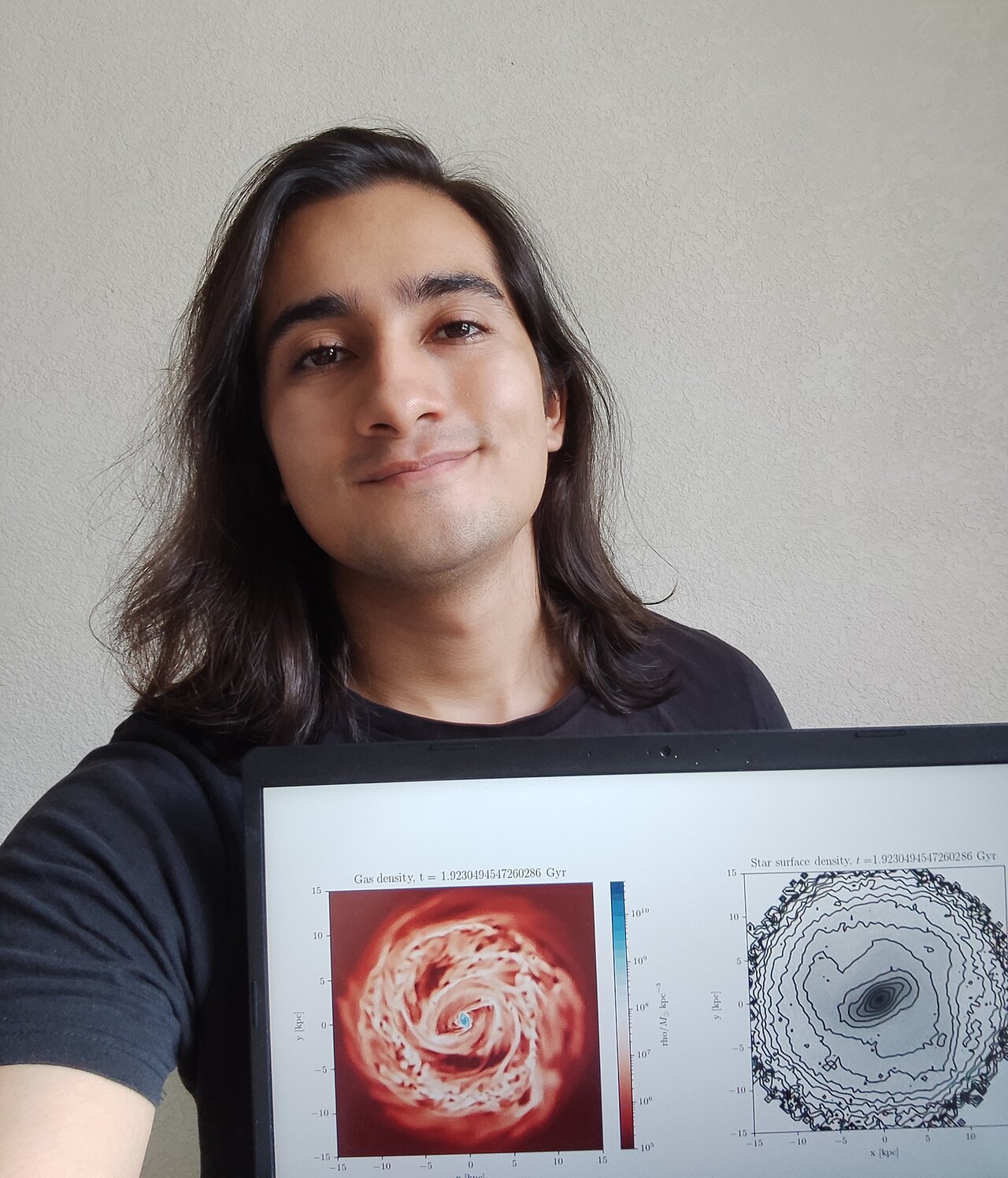
Name: Rodrigo Ferrer Chávez
Nationality: Mexican
University: Autonomous University of Yucatán, Mexico
Project: Go with the flow: probing the flows and fate of gas in barred spiral galaxies
Advisors: Francesca Fragkoudi, Eric Emsellem and Adrian Bittner
“If someone asked me what motivated me to apply for ESO’s Summer Research Programme, I would say: who would not want to work at ESO?! It’s one of the most exciting places to do science in the world!
In particular, for my project I analysed numerical simulations to understand the properties of nuclear discs at the centres of barred galaxies. I learnt a ton about galaxy dynamics and stellar populations from a theoretical perspective, which I find super valuable and transferrable. I also learnt a lot about observations and numerical simulations: how they are set up, how to analyse them…and how NOT to analyse them!
My fondest memory has to be the final presentation: it was so encouraging to see the other students presenting their work. I could not stop thinking that these people are probably going to be some of the leading scientists (or entrepreneurs, or whatever they decide to be) in their respective fields in a few years, so I was extremely grateful for having the opportunity to see them on the rise. My fondest memory would be that… or finally solving a bug in my code after one week trying? Tough decision!
But of course, there have been challenges too! For example, working remotely was not easy for me, because there is a deadly time difference of seven hours between central Europe and my home in Mexico, so it was tricky to make the times work out! Luckily the organisers and supervisors were very mindful of time differences when setting up meetings or talks. Aside from that, I did not have any issues carrying out the project remotely, though I would have loved to meet ESO and my supervisors in person! Maybe one day…”
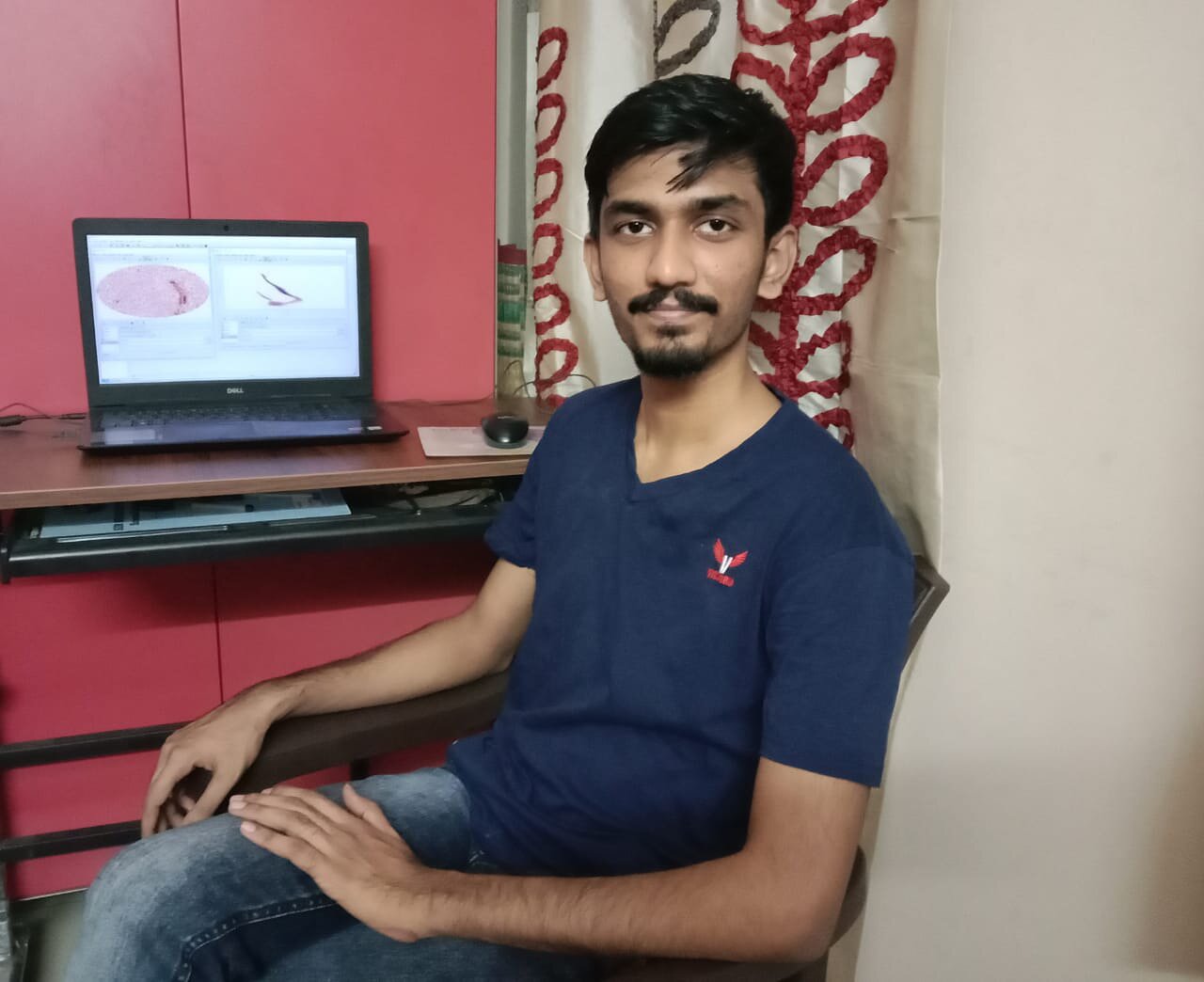
Name: Anirudh Ravishankar
Nationality: Indian
University: Indian Institute of Science Education and Research (IISER), India
Project: From birth to death: the multiple faces of accretion
Advisors: Anna Pala, Carlo Manara and Nicola Gentile Fusillo
“My fondest memory from the ESO Summer Research Programme is the welcome workshop. I got to see a lot of new faces from so many different places and something that connected most of them was seeing them talk about their cats in the introductions — I found that very delightful! The atmosphere made me feel comfortable very quickly, and made for a great head start.
My project focussed on characterising two types of accreting variable objects called cataclysmic variables and young stellar objects using Gaia. Working remotely was challenging as my time zone is 3.5 hours ahead, but I managed to make the most out of it and in no way did it affect how much I've learnt.
I've had the opportunity to interact with a lot of people, and I've definitely picked up some confidence in my communication skills. I made my first ever presentation to an audience and it was a very illuminating experience, both to prepare and to make it!
The experience has reaffirmed that my original plan of pursuing astronomy and astrophysics was well-founded. The programme provided me with a flavour of how research work progresses, and it was as exciting as I had anticipated. Through the lectures, I also realised that the theories behind all the work were something I loved learning as well.
Interacting with so many people in astronomy, and having a glimpse of the ESO environment has been the best experience in my academic life so far. I was thrilled to be a part of it! I'd love to be involved with ESO again sometime in the future.”

Name: Louise Kluge
Nationality: German
University: Heidelberg University, Germany
Project: The mysterious [CII] emission in the interstellar medium of galaxies
Advisors: Michele Ginolfi, Gergö Popping and Paola Andreani
“I feel like project work gives me the freedom to explore a topic more broadly but also more in-depth than it would have been covered in a lecture, hence I was looking for a summer project. When I found the ESO Summer Research Programme, it offered everything that I had been looking for and even more! I was very excited by the topics that were listed and I also hoped that I could meet other motivated students from all over the world, to have chats about getting into astrophysics and life as a student.
In my project I looked at the luminosity coming from the interstellar medium of galaxies. As part of this, I learnt how to analyse ALMA data with the CASA software, which is definitely a new skill I acquired and hope to be able to use in the future.
I am currently doing a bachelors in mathematics, but the last six weeks confirmed for me that I would enjoy working in astrophysics in the future. I especially liked the diversity in topics within ESO and enjoyed meeting lots of interesting people.
If anyone reading this is wondering whether to apply for the ESO Summer Research Programme, I strongly want to encourage them, especially if, like me, you have interest in applying your skills to topics in astrophysics. I would not want to miss any of the experiences I had in the last six weeks! The supervisors and organisers really did a great job of making me feel welcome, and a lot of work is done in designing the projects so that you get to learn as much as possible from working on them.”
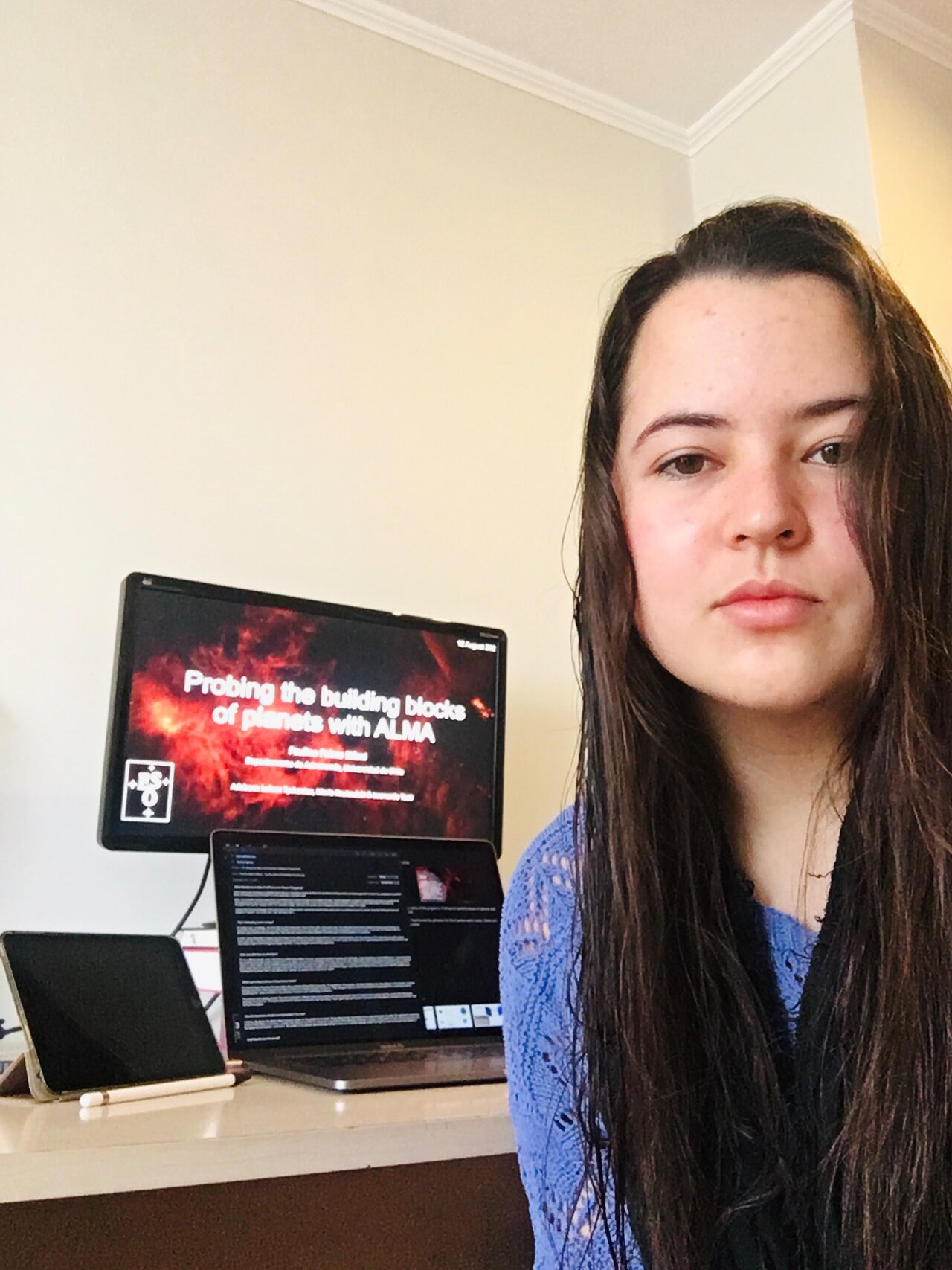
Name: Paulina Palma Bifani
Nationality: Chilean
University: University of Chile, Chile
Project: Probing the building blocks of planets with ALMA
Advisors: Łukasz Tychoniec, Maria Koutoulaki and Leonardo Testi
The main goal of my project was to understand how, when, and where dust starts to grow and form planetary-sized bodies. In order to achieve this goal we analysed ALMA observations in two different wavelengths in young Solar-System analogues in the star forming region of Perseus.
ESO is well known for being an incredible place where an international community shares an excitement for doing science and learning about the Universe. So just getting to know ESO better and being part of its environment for some weeks was a motivation in itself to apply!
For sure the best thing about the past weeks was interacting with the ESO community. The organisers of the programme, the lecture teachers, the other students of the programme, my direct advisors and all the other students and fellows of ESO are incredible scientists and people! They manage to have an online community that actually feels like a community which is something that I value a lot and is challenging to achieve. All the organizing members and the other students tried very hard to make it work during the six weeks, resulting in a very enjoyable and enriching experience.
The lectures were amazing as well. Something I'll never forget (and hope I’ll be able to see in person in the future) are the ESO telescopes, especially the upcoming Extremely Large Telescope. The lecture about the ELT being constructed was fascinating! I hope I get to work with its data in the future and while doing it, I’ll remember the fantastic time I had during the ESO Summer Research Programme, an experience I will treasure forever.”

Name: Natalie Grasser
Nationality: Austrian
University: University of Vienna, Austria
Project: Measuring IMF in high density stellar systems, i.e. relic galaxies and globular clusters
Advisors: Magda Arnaboldi, Lodo Coccato, Chiara Spiniello (Oxford) and Carlos Barbosa (Univ. S. Paulo)
“I’ve wanted to go into research ever since I finished school, and this experience has only strengthened that desire.
My project was about measuring the distribution of stellar masses in dense stellar systems. We didn’t actually get to that point, but the research I did was amazing nonetheless! With the help of my supervisors, I analysed the light from possible globular clusters in the giant elliptical galaxy NGC3311, finding for example the velocity of stars and identifying their chemical composition.
I feel I could have accomplished more if I had been at ESO in person, as I do find working remotely very challenging. It is harder to stay focused, and communication is also more difficult if one cannot interact in person. But still I have learnt a lot about working with astronomical data, analysing spectra of stellar populations, and also many new things about coding with Python, a skill that will prove useful, no matter what I plan to do in my future research.
And the results I obtained near the end of the programme were the most satisfying, seeing all the work I’ve done during the last few weeks fall into place. It was a very empowering feeling, knowing that this work was not only for my personal learning experience, but also a contribution to research.”
Are you a university student, not yet enrolled in a PhD programme, and would like to participate in the next edition of the ESO Summer Research Programme? Then keep an eye on our upcoming workshops webpage, as well as our Twitter and Facebook pages, where we will announce the next round of applications in due time.
Interviews conducted and edited for clarity by Thea Elvin and Giulio Mazzolo.
